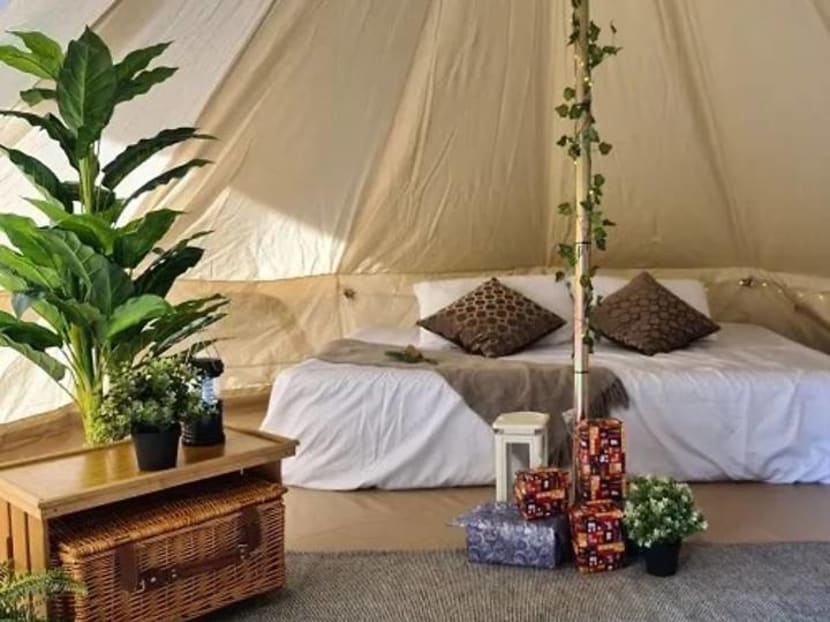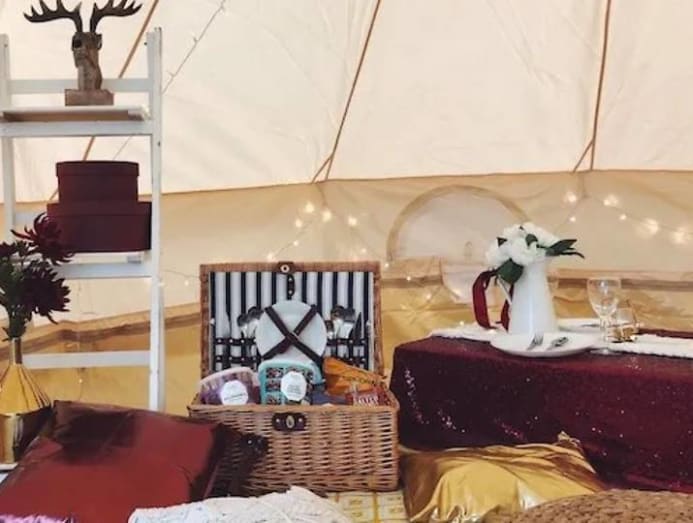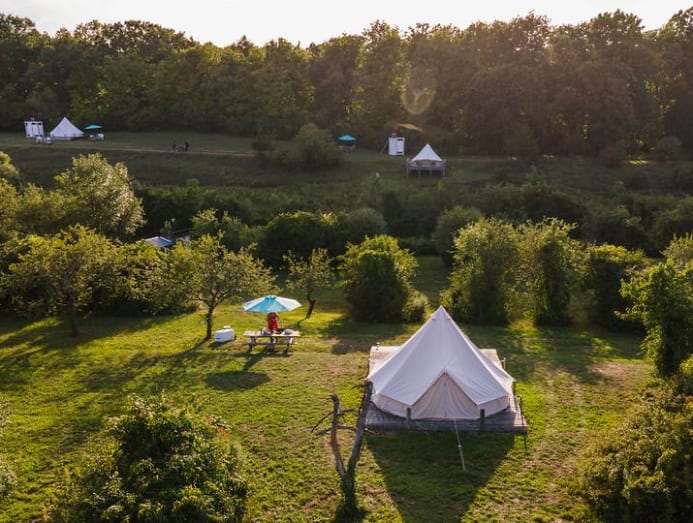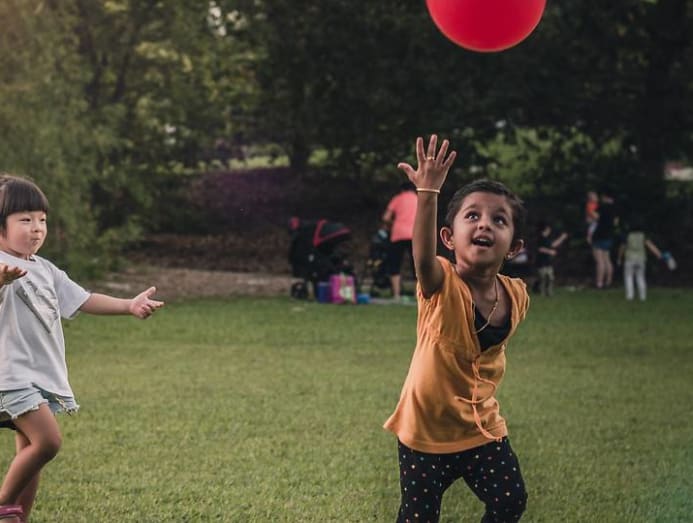commentary Commentary
Commentary: Glamping at Jewel Changi Airport - where’s the fun in that?
Setting up tent in the middle of a mall may sound fun but it takes away many things that are good about traditional camping, says CNA’s Crispina Robert.

Glampcation at Shiseido Forest Valley. (Photo: Changi Airport)
SINGAPORE: I forget many things with increasing regularity these days but there’s one memory that stands out like a shard of glass in the sunlight of my mind.
I am sitting on a beach at Pulau Ubin, using a portable gas cooker making instant noodles. A gust of wind tosses sand into the soup and I deflate, thinking, we now have to eat Maggi noodles with a side of sand.
When you are hungry and there isn’t a McDonald’s nearby, anything will do.
Besides, it didn’t really matter much to my boys and the husband, who by now, were off looking for crabs by the shore.
For a large part of my life as a young mother, I went camping. A lot. We pitched tents at East Coast Beach, Pulau Ubin and Changi.
We went the whole hog – tents, little foldable chairs, portable stove, nets for fishing, a cooler box for drinks and torchlights for night walks.
Usually these trips lasted two nights and frankly, they were not my idea of fun.
Uneven grass is a death knell for a light sleeper. The lack of proper shower facilities, the endless packing and cleaning, the insect bites and sand everywhere – you get the picture.
READ: Commentary: No travel plans these school holidays, but that's ok
Yet, we went on countless camping trips and looking back, while they were a feat of parental sacrifice on my part, they did a world of good for my boys.
INNOVATIVE BUSINESS IDEAS
My first reaction on learning about Changi Airport Group’s newest offering for travel-starved Singaporeans on Wednesday (Nov 18) – staying in a tent at Jewel – was to dismiss it as another strange idea the pandemic has unleashed upon businesses trying to make money.

This idea of paying hundreds of dollars to sleep in a fancy tent in the middle of a gigantic mall seemed like an odd way of staying out for the night – for the same price, why not just check into a hotel?
LISTEN: Will going on an overseas holiday be practical and safe?
READ: Commentary: I used to think a staycation was a poor alternative for being overseas. Then I took one
Yet, this concept of glamping is not new and has fast gained popularity. As the name implies, it is a mix of glamour and camping, a style of camping with all the bells and whistles and none of the awful things associated with traditional camping.
There are businesses dedicated to glamping that sound fabulous. If you want to treat your partner to a night under the stars, the starter package includes a tent that is “romantically decorated with flower petals strewn inside the tent to set the mood”.
You can pay more for a bigger tent which looks like a hotel room – complete with rugs and a chaise lounge, lovely fairy lights and of course, wine and food.
There are glamping packages all over Singapore – major five star hotels offer the service to families. So parents can climb into bed while their children crawl into tents.
Everything is sanitised and safe and everyone can get up the next day without a sore back or mosquito bites.
It all does sound very tempting because truth be told, why on earth would anyone go through unpleasant camping hardships on a vacation?

Especially the men who have gone through National Service. Suggesting they pitch a tent and eat out of a mess tin does not strike me as a family friendly conversation.
A CHANCE TO KNOW EACH OTHER
To me though, the whole idea of camping is precisely about roughing it out, braving the elements, learning how to keep a fire going with dried twigs or pitch a tent, swim in the sea or walk on a pitch-dark road even if you are frightened.
The value of camps, especially for children is what it inculcates in them – a spirit of adventure, leaving creature comforts behind.
There is no lack of research to show that screen time among children have increased – by some estimates more than double in the last two decades according to the BBC.
When children spend more on their screens, the most obvious corollary is that they spend less time outdoors, the Washington Post calls this “trading green time for screen time”.

And this lack of exposure to the natural environment has some downsides. The Harvard Health blog lists six benefits of outdoor time – sunshine and exercise are important to lift moods, reduce anxiety and boost happiness. Then there is the appreciation of nature.
Dr Claire McCarthy, a senior faculty editor at Havard Health Publishing puts it perfectly: “If a child grows up never walking in the woods, digging in soil, seeing animals in their habitat, climbing a mountain, playing in a stream, or staring at the endless horizon of an ocean, they may never really understand what there is to be lost.”
READ: Commentary: What the Singapore tourism vouchers are really about
In my own experience though, the biggest payoff a few days in the outdoors is the unstructured time the children got. This is something that cannot be found in our busy lives filled with long hours at work and school.
The best part of camping was sharing spooky stories, for us to really listen to them, which we did not get a chance to do in an urban setting where they are often on their digital devices.
You could most certainly sit around a darkened hotel room and do the same – but can you imagine the difference in atmosphere? Out in the wild, the story of a spurned spirit takes on a completely different complexion, especially if you hear rustling in the forest behind.
LISTEN: PSLE results: Three working adults confront its impact and other surprising revelations years later
In having no agenda whatsoever, the boys had to negotiate, figure things out, amuse themselves and deal with each other and their fears of the natural world, something Dr McCarthy calls the cultivation of “executive function”.
These are soft skills that are best cultivated in situations like camping.
This sense of adventure and the love for the outdoors has endured in both of them. Our family camping days are long over but on their own, my sons have since gone on many adventures – one even climbed all the way to Everest Base Camp.
Unfortunately during this pandemic, NParks has closed all camping and BBQ facilities until further notice.
READ: Commentary: Head out and enjoy Singapore's nature spots
READ: Discovering Singapore on foot: Highlights of a 5-day walk around the island
But I do hope even as you enjoy the luxuries of glamping, it will not stop you from trying something a little more challenging when the green light is eventually given.
You might absolutely hate it and swear never to do it again but your children will thank you for giving them the gift of an adventure.
Plus, I guarantee you are unlikely to forget such a novel “holiday”.
Crispina Robert is an editor at CNA Digital News where she oversees podcasts.





